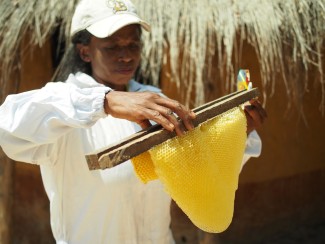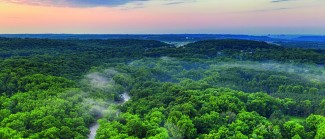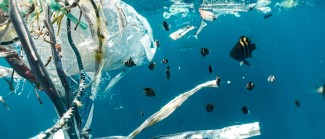Island states in the Pacific Ocean are jointly developing environmentally sound trade standards while building walls against sea levels rising due to climate change.
Quality Infrastructure as an entry point to sustainability
When tropical cyclones sweep through the island nation of Vanuatu in the South Pacific Ocean, they often leave a trail of destruction, devastation and flooding. This archipelago of 80 islands located east of Australia faces an existential threat from rising sea levels caused by climate change.
To hold back the rising sea levels, a new seawall was built along the coast of Port Vila, the capital. Apart from a pedestrian promenade next to the dazzling blue water and piers to dock tourist boats, the seawall also created trading spaces for local handicrafts and tourism entrepreneurs. It also birthed beautiful landscaping that locals use daily for recreation.
In a way, the climate disaster provided an opportunity to build back better. But a different kind of infrastructure is helping to set standards that address the needs of the countries in the Pacific, and which are sustainable to allow countries to build green economies whose goods and services are competitive in global markets. Quality Infrastructure (QI) is broadly understood as the system of policies, laws, institutions, and service providers that support businesses in producing and offering quality goods and services and get them internationally recognised to meet specific market requirements.
Coordinated by the Pacific Island Forum, the Pacific Aid-for-Trade Strategy identifies target areas where countries in the region can achieve better results by working together, as opposed to working in isolation. They include services, connectivity and e-commerce, as well as deepening the market. The Pacific Aid-for-Trade Strategy 2020-2025 identified QI as a priority in promoting sustainable development.
The Enhanced Integrated Framework (EIF), which helps developing countries become more active players in the global trading system, supported the development of QI by co-financing the Pacific Quality Infrastructure (PQI) Initiative.
Given the region’s vulnerability to extreme weather events and adverse changes in the environment, investments in QI can pay off in many ways. They can ensure that physical infrastructure is built with quality materials that better withstand severe weather events, as the seawall in Port Vila shows. QI also helps to create a more positive environmental footprint, and at the same time encourages both higher and more harmonized standards for products to access key global markets.
Ordinarily, quality infrastructure organizations like standards bodies set benchmarks for production processes that are environmentally friendly. This drives innovation and enhances trade competitiveness. The International Organization for Standardisation ISO develops standards for production processes. The private sector also develops standards for environmental sustainability like Fair Trade, Rainforest Alliance certification, Forest Stewardship Council, Marine Stewardship Council, and various organic certifications tailored to destination markets.
In addition, to assess conformity, independent laboratories, certification and accreditation bodies foster trust between sellers and buyers, which is invaluable to promote trade. For instance, products from countries that are verifiably certified to be organic, forest-safe, as well as pesticide- and toxin-free, are increasingly much sought after.
Given the small size of the population and economies, a regional approach to Quality Infrastructure is particularly important for Pacific Island countries. Establishing fully-fledged national systems would not be feasible and require considerable investments and tie-up resources, while a regional approach ensures value for money through harmonized standards and conformity assessment procedures, and make it easier for products and services to be traded regionally and internationally.
As the centrepiece of regional QI, the Initiative has led to the creation of the Pacific Islands Standards Committee tasked to develop and harmonize regional standards, including for building and construction. The committee is currently on a regional energy efficiency standard for buildings, based on a New Caledonian standard.
Freely accessible to all Pacific members, the standard will be a reference point for national building codes. It sets a high bar for energy performance and promotes sustainable construction practices throughout the region. It will lead to buildings that are more environmentally friendly and energy-efficient. Future work by the Committee will focus into minimizing construction waste and encourage the use of natural materials and sustainable building practices.
Trade and environment beyond Quality Infrastructure
The need to build linkages between trade and the environment goes beyond Quality Infrastructure. The environmental crisis poses existential threats including sea-level rise, acidification, loss of biodiversity, and destruction of habitats. These have severe economic outcomes, such as increasing food insecurity and damaging infrastructure.
As trade can exacerbate environmental issues, policies related to it must be adapted to reduce harmful effects. Measures could include, for example, promoting trade in environmental goods and services, transferring green technology, discouraging plastic pollution, and eliminating fossil fuel subsidies. By developing common regional positions, environmental and trade communities can ensure that a Pacific perspective is considered on the global stage.
Inversely, the trade and environmental community should prioritize policies that promote trade competitiveness while protecting the environment. More and more people across the globe are demanding environmental sustainability, and countries unable to show that their goods and services are aligned with these demands will eventually lose competitiveness.
Apart from playing defence, we can play offence by emphasizing recycling and the circular economy, implementing incentives to transition to environmentally friendly products and production processes, and leveraging Aid-for-Trade to support these linkages between trade and the environment.
To this end, the Pacific Islands Forum will convene a regional workshop for trade and environment officials in 2024 where academic research, experiences, and best practices on sustainable development strategies will be shared, and a roadmap to a common agenda drawn up.
The challenges posed by the environmental crisis are particularly acute for small Pacific islands. Therefore, we must take bold and decisive steps to address these issues, including seeking financial and technical support from the global development community.
By working together, the walls we are building against the rising sea can become bridges to a future of sustainable trade adapted to a changing environment and built to a high set of common standards and supporting institutions.
If you would like to reuse any material published here, please let us know by sending an email to EIF Communications: eifcommunications@wto.org.



